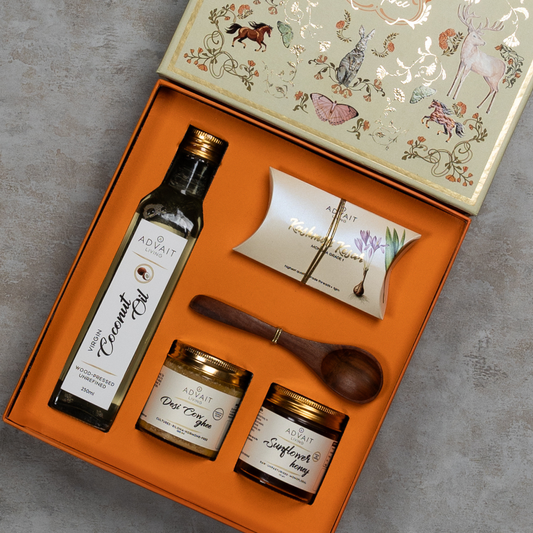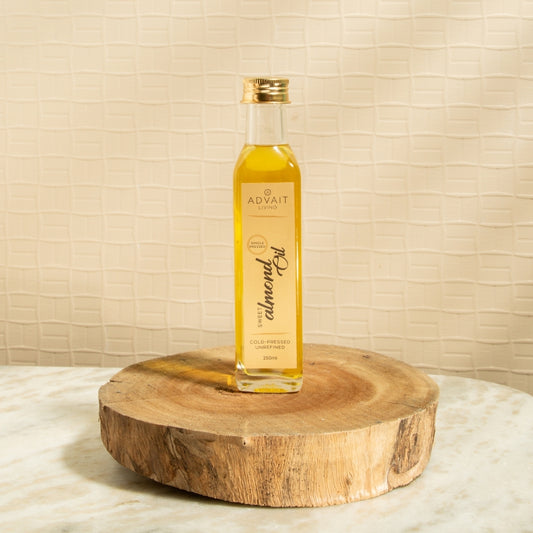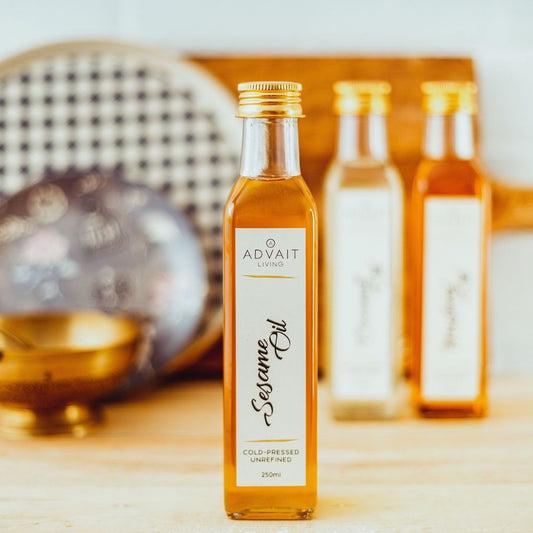Oil pulling is a traditional practice that promotes oral and overall health and, in ancient times, was religiously performed as a morning ritual to remove toxins from the mouth and strengthen gums, enhancing oral hygiene. It is gaining worldwide popularity due to its adoption by celebrities, social media and scientific validation of its health claims.
If you are looking to switch to safer and natural oral care routines, adopting oil pulling with cold pressed virgin coconut oil can be very beneficial for remarkable oral health due to its multiple health benefits and pleasant taste.
Ayurveda, originating over 3,000 years ago in India, emphasizes balance among body, mind, and spirit, and the use of natural remedies and lifestyle practices for health and wellness. Ayurveda is experiencing a resurgence due to growing interest in holistic and natural health practices, an increasing focus on preventive care and most significantly the scientific validation of some Ayurvedic treatments. People across the globe are gradually moving towards leading a natural and sustainable lifestyle, and hence, Ayurveda is slowly and gradually taking centre stage in our lives once again.
Oil Pulling: What is it?
Oil Pulling is one such notable Ayurvedic practice that originated in ancient times and is gaining vast popularity today. Ayurveda views the mouth as a gateway to the body’s overall health, and oil pulling is believed to enhance oral hygiene, lessen plaque, eliminate toxins, and improve oral microbiota balance.
Oil pulling involves a teaspoonful of any kind of oil swished around the mouth early in the morning, preferably before having breakfast, for about 15-20 minutes. The oil is 'pulled' and forced around the oral cavity. The ‘pulled’ oil will become viscous, milky white and thinner, having pulled out deposits from the teeth and gums. This oil is then discarded and the mouth is rinsed thoroughly with clean warm water.
Traditionally, Ayurveda recommends cold pressed sesame oil for use during oil pulling; however, in more recent times, cold pressed virgin coconut oil has gained massive support as people’s choice and go-to oil for oil pulling. Here is a comprehensive guide on how to oil pull and the right way to do it.
Cold pressed coconut oil has become one of the top choices for this practice because of its versatile uses and rich nutrient structure, and pleasant taste & smell. It is also devoid of trans fats, making it an excellent option for maintaining oral health. Research indicates that oil pulling with coconut oil can be an effective and preventive measure for decreasing plaque formation and plaque-induced gingivitis. Amongst all the cold pressed oils, virgin coconut oil has become very popular due to its flavour, taste and smell. It is the main reason why people prefer to do oil pulling with it compared to other oils.
How Does Virgin Coconut Oil Improve Oral Health?
Virgin Coconut Oil’s health benefits for oral hygiene stem from its antimicrobial properties, primarily due to its high lauric acid, a medium-chain fatty acid that makes up around 50% of coconut oil's fat content. Lauric acid is lauded for its antimicrobial activity that protects against bacteria, viruses, and fungi, potentially reducing harmful oral pathogens. Also, coconut oil's viscosity allows it to adhere to oral surfaces, aiding in the removal of plaque and bacteria during oil pulling. Many studies show that oil pulling can be used as an effective preventive adjunct in maintaining and improving oral health. The extra perks of coconut oil are its anti-inflammatory and healing properties that play an important role in reducing gum inflammation, soothing irritation, and promoting oral healing.
Here are some proven benefits of coconut oil pulling for improved oral hygiene and preventive care:
I. Reduces Harmful Bacteria
Coconut oil, packed with lauric acid that has antimicrobial properties, is effective against various harmful bacteria and fungi, including Streptococcus mutans and Candida albicans. In addition, coconut oil contains other compounds like capric acid and caprylic acid, which also exhibit antimicrobial effects. These properties make coconut oil a potential and natural remedy for preventing bacterial infection in the mouth.
Streptococcus mutans is an opportunistic and cariogenic bacterium which occurs naturally in the mouth. It can be harmful and lead to tooth decay and cavities. A randomised controlled study found that oil pulling with coconut oil led to a significant reduction in Streptococcus mutans count within 2 weeks of regular practice.
Another study in 2016 was conducted on 50 children and found that coconut oil pulling was as effective as chlorhexidine in reducing the S. mutans count over 30 days. This could be due to the presence of lauric acid, which interacts with the bacteria when you oil pull with coconut oil. The lauric acid works on disrupting lipid membranes, leading to bacterial cell death.
II. Combats Plaque Formation
Plaque is a colourless film that forms on the teeth and along the gumline every day and can potentially lead to tooth decay or gum diseases. It forms from leftover food particles, saliva and mouth bacteria with their acidic byproducts.
Oil pulling is a great way to remove plaque, and coconut oil pulling is very effective in preventing the formation of plaque. The oil-pulling mechanism forces the swishing of the oil between teeth and gums. This swishing creates mechanical shear forces that are exerted on the oil leading to its emulsification greatly increasing the surface area of the oil. This increase in the oil’s surface area reduces plaque adhesion and bacterial coaggregation, preventing plaque buildup.
A study conducted on 60 teenagers for about 30 days found that oil pulling with coconut oil significantly decreased plaque formation from day 7 onwards and the scores continued to decrease during the period of study. Another randomized controlled study carried out among 40 dental students, found a significant reduction in plaque formation with the coconut oil pulling method.
III. Reduces Gingivitis
Gingivitis is a common and mild form of gum disease that is caused by the bacteria in the plaque. Chlorhexidine, commonly used in mouthwash, is considered the most effective anti-gingivitis agent that kills bacteria and reduces gum inflammation, thus preventing gingivitis from occurring. However, chlorhexidine may lead to unwarranted side effects such as alteration in taste sensation, an increase in tartar, and temporary staining of teeth, tongue, or oral tissues. It may even sometimes lead to irritation of the gums or swollen glands.
A research study found that oil pulling with coconut oil, with its antimicrobial and anti-inflammatory properties, can be a natural, safe and effective alternative to chlorhexidine to treat gingivitis without staining the teeth as well.
IV. Can Cold Pressed Virgin Coconut Oil Alleviate Bad Breath?
Oil pulling can greatly help reduce halitosis or bad breath. This study evaluated the role of oil pulling in helping the reduction of halitosis or bad breath and found that oil pulling was as effective as chlorhexidine (considered the most effective anti-plaque, anti-gingivitis agent) against halitosis and organisms affecting halitosis. Whilst sesame oil was used in the aforementioned study, coconut oil, with its antimicrobial effect and potential to reduce plaque and gingivitis, may have similar effects on halitosis or bad breath. However, more studies are required to determine its actual effectiveness.
V. Fights Yeast and Candida Infections
Candida albicans is a naturally occurring fungus in our body and may appear as ‘oral thrush’, a localized Candida infection that occurs in the mouth. This may show up as creamy white lesions on the tongue and inside of the mouth and occurs due to suppression of an immune response, poor gut health or an overdose of antibiotics.
A study evaluated the potency of the antifungal properties of coconut oil and found that coconut oil is a highly effective antifungal agent and has higher properties than that of probiotics against C. albicans. Hence, coconut oil pulling can help fight off localized Candida infection that occurs in the mouth, kill the Candida yeast and freshen your breath. It can be an effective way to eliminate yeast from your mouth and remove the toxic byproducts of Candida.
VI. Avoids Staining of Teeth
Tooth discolouration can occur on the teeth and along the gum line, and one of the more common reasons for a yellow coating (developing along the gum line) is tartar buildup. Coconut oil pulling is a proven, effective and safe method for the prevention of plaque buildup and thereby prevents the formation of tartar; it can help keep the teeth white and prevent tooth discolouration. It is important to note that coconut oil is not a direct bleaching agent and does not contain any whitening properties on its own.
However, the use of coconut oil for oral care is safe and does not leave any stain on your teeth (unlike chlorhexidine, a common ingredient in toothpastes and mouthwashes). Instead, consistent practice to maintain oral hygiene and the addition of oil pulling routines can lead to healthier gums, which in turn can keep the teeth white.
VII. Maintains Oral Microbiota
In recent years, discussions around oral microbiota and its massive significance on our overall health have come under the spotlight. It is estimated that there are as many as 20 billion microbes, with as many as 500 to 650 different species, that are present inside the mouth at any given time. Some metagenomics evidence suggests that chemical mouthwashes with antibacterial and antifungal agents have immense potential to alter the oral microbiome. Evidence suggests that chemical mouthwashes may be creating “dysbiosis,” whereby certain species of bacteria are killed, leaving others, sometimes unwanted, to predominate. And increasing use and daily application is also suggesting that mouthwashes, much like antibiotics, may be leading to antimicrobial resistance in oral hygiene.
Conversely, Oil Pulling has been used for centuries, and no evidence is recorded to show any harmful effect on oral microbiota. Hence, switching to oil pulling, instead of using mouthwashes, can be a natural, safer and more effective way to maintain the oral microbiota and prevent any long-term health hazards.
Choosing the Best Coconut Oil for Oil Pulling
Coconut oil is a popular choice for oil pulling due to its overall health benefits. However, with various types of coconut oil available, choosing the best one for oil pulling is important. Let's look at the different types of coconut oil available in the market for oil pulling.
Types of Coconut Oils
- Refined Coconut Oil: It is made from dried coconut meat, known as copra, and is extracted using extensive processes including application of toxic solvents and several chemical processing and refining. This type of oil has a longer shelf life and a higher smoke point. However, due to several levels of processing, refined coconut oil may contain fewer nutrients compared to its unrefined counterparts.
- Cold Pressed Coconut Oil: Cold pressed coconut oil or unrefined coconut oil is made from fresh coconuts that are mechanically pressed without applying any external heat or toxic solvents. This type of oil retains its original aroma and flavour as it is loaded with antioxidants, vitamins, and beneficial fatty acids. It thus preserves more nutrients making it an unadulterated natural and safer product.
- Organic Coconut Oil- This oil is made from coconuts grown without synthetic pesticides or fertilizers. It is available in both refined and unrefined forms, and being organic, it is environmentally friendly and free from harmful chemicals. However, the cost is usually higher due to the organic certification.
Selecting a good quality coconut oil that is unrefined, cold pressed and organic will provide a safer, non-toxic and more potent coconut oil for oil pulling.
How to Use Coconut Oil for Oil Pulling?
It's simple to incorporate oil pulling for teeth into your everyday regimen. Here is a step-by-step guide:
- Select a High-Quality Coconut Oil: For the best possible results, go with a high-quality, organic, cold pressed coconut oil.
- Measure the Oil: Measure out approximately 1 tablespoon of coconut oil. If the oil is solid at normal temperature, it will melt quickly in your mouth.
- Swish the Oil: Swish the oil around in your mouth for 15 - 20 minutes. 'Pull' and force the oil between all teeth by swishing it throughout the mouth. Make sure to distribute the oil throughout every part of your mouth, including the spaces between your teeth. Since the oil contains bacteria and toxins extracted from your mouth, refrain from drinking it.
- Spit It Out: Spit the ‘pulled’ oil into a container after 15 to 20 minutes. To avoid blocking the sink, refrain from spitting it into the sink.
- Rinse and Brush: Use warm water to thoroughly rinse your mouth. You can brush your teeth as usual to get rid of any bacteria and any oil residue.
Conclusion
In a nutshell, oil pulling with coconut oil is an easy, affordable technique that can greatly improve your oral health. Reduction of harmful bacteria, prevention of plaque formation, reduced risk of gingivitis and benefit of balanced oral microbiota are now well-supported by research and conventional use. You can benefit from a healthier mouth and enhance your general well-being by including oil pulling into your daily routine.
Coconut Oil Pulling should be used as an adjunct to normal preventative regimes such as flossing and brushing to improve oral health and dental hygiene. Choosing a high-quality cold pressed virgin coconut oil provides a superior option for those seeking a safer, non-toxic, natural, holistic approach to oral care. It's a simple, all-natural solution that works with any kind of lifestyle.
Frequently Asked Questions
1. Is oil pulling a substitute for flossing and brushing?
No, oil pulling is not a substitute for flossing and brushing. While oil pulling can help reduce bacteria and improve oral hygiene to some extent, it does not effectively remove plaque and food particles like brushing and flossing do. Dentists recommend using oil pulling as a supplementary practice rather than a replacement for traditional oral hygiene methods.
2. Can kids engage in oil pulling?
Yes, kids over 10-12 years of age can engage in oil pulling, but it should be done with caution and under adult supervision. It's important to ensure they do not swallow the oil and can comfortably swish it in their mouths for a few minutes. Consulting with a pediatric dentist before starting oil pulling is also recommended.
3. Which kind of coconut oil is best for oil pulling?
Coconut oil is considered the best oil to use for oil pulling due to its pleasant taste, availability, and antimicrobial properties. Virgin coconut oil is particularly recommended. It is unrefined, retaining its natural antioxidants and antimicrobial properties, making it more effective for oral hygiene compared to refined coconut oil. Use cold pressed, organic and high-quality coconut oil to guarantee that you are receiving the purest form of oil possible.
4. Can teeth be made whiter by oil pulling?
Oil pulling prevents staining of teeth and plaque formation. This helps keep your teeth white. Its primary benefit lies in improving overall oral hygiene rather than significantly whitening teeth. However, it may not completely whiten previously stained teeth.
5. What are the health benefits of oil pulling?
Oil pulling is believed to offer several health benefits, including improved oral hygiene by reducing bacteria, plaque, and bad breath. It may also promote healthier gums and help prevent cavities. Some proponents claim it can have additional benefits like reducing inflammation and detoxifying the body, although more scientific research is needed to fully support these claims.




























